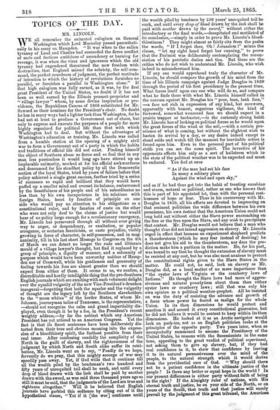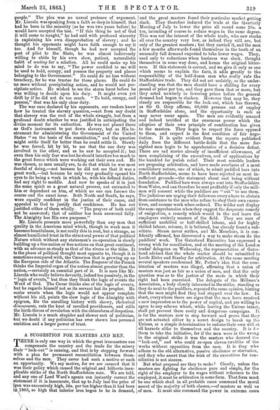TOPICS OF THE DAY.
MR. LINCOLN. the wealth piled by bondonen by 250 years' unrequited toil be sunk, and until every drop of blood drawn by the lash shall be paid with another drawn by the sword," without either the introductory or the final words,—decapitated and mutilated of its conclusion,—simply in order to prove Mr. Lincoln's blood- thirstiness ? They might almost as fairly cite from the psalm the words, "If I forget thee, Oh! Jerusalem !" minus the clause, "let my right hand forget her cunning," to prove that the Psalmist was deliberately contemplating the renun- ciation of his patriotic duties and ties. But these are the critics who do not wish to understand Mr. Lincoln, who wish. indeed to misunderstand him.
If any one would apprehend truly the character of Mr. Lincoln, he should compare the growth of his mind from the time of his Illinois campaign against Judge Douglas in 1859' through the period of his first presidency to the present time. What forces itself upon any one who will do so, and compare what he finds there with what Mr. Lincoln himself called in, the canvass against Mr. Douglas his "poor, lean, lank face,' —a face not rich in expression of any kind, but careworn, apparently with honest, sagacious vigilance, the kind of furrowed, somewhat weazened face we should expect in a prairie trapper or beeliunter,—is the curiously strong habit. Mr. Lincoln has of looking on political forces as he would upon the great forces of the wind or the soil,—with a certain pre- science of what is coming, but without the slightest wish to hasten its arrival by a day, or any desire indeed except to stand aside and watch till the moment for inevitable action is forced upon him. Even in the personal part of his political: strife you can see the same spirit. The invective of his opponents affects him only as a sort of hailstorm which in, the state of the political weather was to be expected and must be endured. You feel at once "As if the man had set his face In many a solitary place
Against the wind and open sky,"
and as if he had thus got into the habit of treating sunshine and storm, natural or political, rather as one who knows that this is part of his appointed lot, than with the personal rest- lessness of hope or fear. Thus in his controversy with Mr. Douglas in 1859, all his efforts are devoted to impressing on that eminent politician the wide difference between his own prescience, his own instinct that the American Union could not long hold out without either the Slave power encroaching on the free or the free upon the Slave, and any wish to precipitate that contest. Mr. Douglas would not believe that a man who thought thus did not intend aggression on slavery. Mr. Lincoln urged in effect that because an experienced shepherd predicts a thunderstorm (which he may fear instead of desiring) he does not give his aid to the thunderstorm, nor does the pre- diction make him a partizan in the matter. He, for his part,, was bound to say that he thought the extension of slavery must be resisted at any cost, but he was also most anxious to protect the constitutional rights given to the Slave States in the matter. He could not, he said, look on slavery as Arr. Douglas did, as a local matter of no more importance than "the oyster laws of Virginia or the cranberry laws of Indiana." He thought the Slave laws had more of aggres- siveness and natural proselytism about them than either oyster laws or cranberry laws ; still that was only his own opinion as a political weather-prophet. All he insisted on was the duty of resisting the advance and growth of a force whose power he feared as malign for the whole Union. In its then dimensions he would protect and sanction it and accord it every constitutional guarantee, but he did not believe it would be content to keep within its then dimensions. He looked at it as an Arctic navigator would look on pack-ice, not as an English politician looks at the principles of the opposite party. Two years later, when so unexpectedly summoned to assume the Presidency of the United States, he reasons with the Secessionists in the same tone, appealing to the great verdict of political experiment, not asking them to give up slavery, but, if they had real confidence in it, to show that confidence by leaving it to its natural persuasiveness over the mind of the people, to the natural strength which it would derive from the providential care of God. "Why should there not be a patient confidence in the ultimate justice of the people ? Is there any better or equal hope in the world ? In our present differences is either party without faith of being in the right ? If the Almighty ruler of nations, with His eternal truth and justice, be on your side of the North, or on yours of the South, that truth and that justice will surely prevail by the judgment of this great tribunal, the American
people." The plea was no unreal pretence of argument. Mr. Lincoln was speaking from a faith so deep in himself, that had he been in the minority (as he was two years before) he would have accepted the test. "If this thing be not of God it will come to naught," he had said with profound sincerity in explaining his own disapprobation of slavery ; and he thought his opponents might have faith enough to say it too. And for himself, though he had now accepted the post of pilot to the State, he was almost ludicrously willing to abide by his own slow, patient, naturalistic habit of waiting for a solution. All he could make up his mind to do was to say, "The power confided to me will be used to hold, occupy, and possess the property and places belonging to the Government." He could do no less without treachery, for he was trustee for those places. He could do no more without precipitating action, and he would not pre- cipitate action. He wished to see the storm burst before he was willing to decide upon his duty. It might even yet drift by if he did not do too much. "To hold, occupy, and possess," that was his only clear duty. The war once declared by his opponents, our readers know how he treated the slavery question,—not from any doubt that slavery was the root of the whole struggle, but from a profound doubt whether he was justified in anticipating the divine moment for its extinction. He was not placed there -as God's instrument to put down slavery, but as His in- strument for administering the Government of the United States "on the basis of the constitution," and the question might settle itself far better than he could settle it. Slowly he was forced, bit by bit, to see that the one duty was involved in the other, and as he saw he accepted it ; but even then his only fear was lest he should interfere too much in the great forces which were working out their own end. He was chosen, as men usually are, to do that which he was most fearful of doing,—not because he did not see that it was a great work,—but because he only very gradually opened his eyes to its being a work in which he, with his defined duties, had any right to meddle. And now he speaks of it in just the same spirit as a great natural process, not entrusted to him or dependent on him, of which no one can foresee the course and the exact issue. Both North and South, he says, were equally confident in the justice of their cause, and Appealed to God to justify that confidence. He has not justified either of them wholly. "The prayers of both could not be answered; that of neither has been answered fully. The Almighty has His own purposes."
Mr. Lincoln presents more powerfully than any man that quality in the American mind which, though in weak men it becomes boastfulness, is not really this in root, but a strange, an almost humiliated trust in the structural power of that political Nature which without any statesman's co-operation is slowly building up a free nation or free nations on that great continent, with an advance as steady as that of the rivers or the tides. It is the phase of political thought most opposite to, though it is sometimes compared with, the Ccesaristri that is growing up on the European side of the Atlantic. The Emperor of the French thinks the Imperial organ of the nation almost greater than the -nation,—certainly an essential part of it. It is men like Mr. Lincoln who really believe devoutly, indeed too passively, in the "logic of events," but then they think the logic of events the Word of God. The Ciesar thinks also of the logic of events, but he regards himself not as its servant but its prophet. He snakes events when the logic would not appear complete without his aid, points the slow logic of the Almighty with, epigram, fits the unrolling history with showy, rhetorical denouements, cuts the knot of ravelled providences, and stills the birth-throes of revolution with the chloroform of despotism. Mr. Lincoln is a much stupider and slower sort of politician, hut we doubt if any politician has ever shown less personal ambition and a larger power of trust.































 Previous page
Previous page